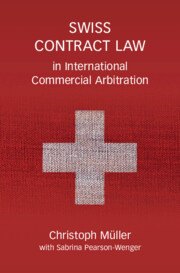1 Swiss law is very frequently chosen as the law applicable to international commercial contracts.
2 After English law, Swiss law is deemed to be the most attractive law applicable to the parties’ contracts.Footnote 1 Indeed, along with English law, Swiss law is, on average, three times more attractive to commercial parties than any other law.Footnote 2
3 This is confirmed by the recent statistics of the International Chamber of Commerce (ICC), according to which, Swiss law is consistently the second or third most popular law chosen to govern the parties’ contract.Footnote 3 This popularity of Swiss law is also confirmed by the recent statistics of the Swiss Arbitration Centre, according to which in 75 per cent of cases between 2004 and 2020, Swiss law was the applicable law.Footnote 4
4 The popularity of Swiss law as the law chosen to govern the parties’ contract is also confirmed by surveys carried out of international commercial actors. Indeed, according to the Queen Mary/White & Case 2010 International Arbitration Survey: Choices in International Arbitration,Footnote 5 Swiss law is the third most popular law used by corporations behind English and New York law. In addition, according to a survey carried out of 100 European businesses in 2008,Footnote 6 Swiss law was the second most preferred choice of governing law in cross-border transactions.
5 Many reasons are cited for the popularity of Swiss law as the law governing the parties’ contract.
6 First, on the one hand, Swiss law allows international commercial actors to agree freely on the rights and obligations in their contractual relationship.Footnote 7 In this regard, there are very few mandatory provisions under Swiss law.Footnote 8 Article 19(1) of the Swiss Code of Obligations (CO) allows parties to freely determine the subject matter of a contract, within the broad limits set out by the mandatory law (see paras 69–70). Swiss contract law is also not subject to European Union (EU) law or too complicated rules about general terms and conditions (see paras 305–326). Moreover, even international commercial actors in Germany reportedly have a policy of choosing Swiss law as the law applicable to their contracts in order to avoid German law’s rather strict regulation of general terms and conditions in business to business (B2B) contracts.Footnote 9 Furthermore, Swiss law guarantees that the agreement that these actors make is binding.Footnote 10
7 On the other hand, these actors can also rely on the values of fairness and justice reflected in, for example, Article 2(1) of the Swiss Civil Code (CC) (‘Every person must act in good faith in the exercise of his or her rights and in the performance of his or her obligations’) (see paras. 71–72). The reasonable and fair expectations of international commercial actors against sharp dealing are thereby also protected.Footnote 11
8 Second, the neutrality of Swiss contract law is also one of the reasons cited for the popularity of Swiss law as the governing law of the parties’ contract.Footnote 12 Indeed, Swiss law does not favour any particular party in commercial dealings.
9 Third, Swiss law is said to be particularly well suited to cross-cultural relationships as the Swiss Code of Obligations (the main source of law for contracts) borrows concepts from several legal systems, in particular the French and the German legal traditions.Footnote 13
10 Fourth, parties originating from Civil law jurisdictions may prefer to choose Swiss law, rather than the other popular laws of Common law jurisdictions such as English and US law, because of its commonalities with the laws of several Civil law jurisdictions, namely French and German law.Footnote 14 Indeed, US law is the first contract law the choice of which European businesses try to avoid.Footnote 15
11 Fifth, the Swiss Code of Obligations is concise and easily accessible.Footnote 16 Indeed, it represents the best of the nineteenth-century Civil law legal tradition but is less complicated and more straightforward than the German Bürgerliches Gesetzbuch (German Civil Code) (BGB).Footnote 17 Both the Swiss Code of Obligations and the Swiss Civil Code are available not only in the official languages of German, French and Italian but also in English.Footnote 18 There is, moreover, a steady and predictable case law which is easily accessible. For example, all decisions of the Federal Supreme Court rendered since 1 January 2000 can be found on the website of this court.Footnote 19
12 Finally, the popularity of Swiss law may also be explained by the attractiveness of Switzerland as a seat of arbitration on the basis that certain parties choose the substantive law of the jurisdiction of the chosen seat of the arbitration to govern their contract.Footnote 20 Indeed, Switzerland is among the top three most popular seats of arbitration in ICC arbitrations.Footnote 21
13 Despite the popularity of Swiss law as the law governing the parties’ contract, most arbitrations do not involve Swiss parties. Indeed, in 2020, there were only forty-eight Swiss parties, representing 1.91 per cent of the total number of parties in all 2020 ICC filings.Footnote 22 In addition, in 2019, there were only sixty-seven Swiss parties, representing 2.68 per cent of the total number of parties in all 2019 ICC filings.Footnote 23 Furthermore, between 2004 and 2019, there were only 31 per cent of Swiss Chambers Arbitration Institution (SCAI, today’s Swiss Arbitration Centre) cases in which the parties were Swiss.Footnote 24 There are, accordingly, a significant number of non-Swiss parties who will be involved in arbitration proceedings where their contract is subject to Swiss law.
14 Furthermore, English is usually chosen as the language of the arbitration proceedings. This is reflected in the recent ICC and SCAI Dispute Resolution Statistics, according to which in four-fifths of all cases, the arbitral awards were drafted in the English language.Footnote 25
15 This book on international commercial contracts under Swiss law in the English language therefore answers a need of the growing number of arbitration practitioners all over the world.

